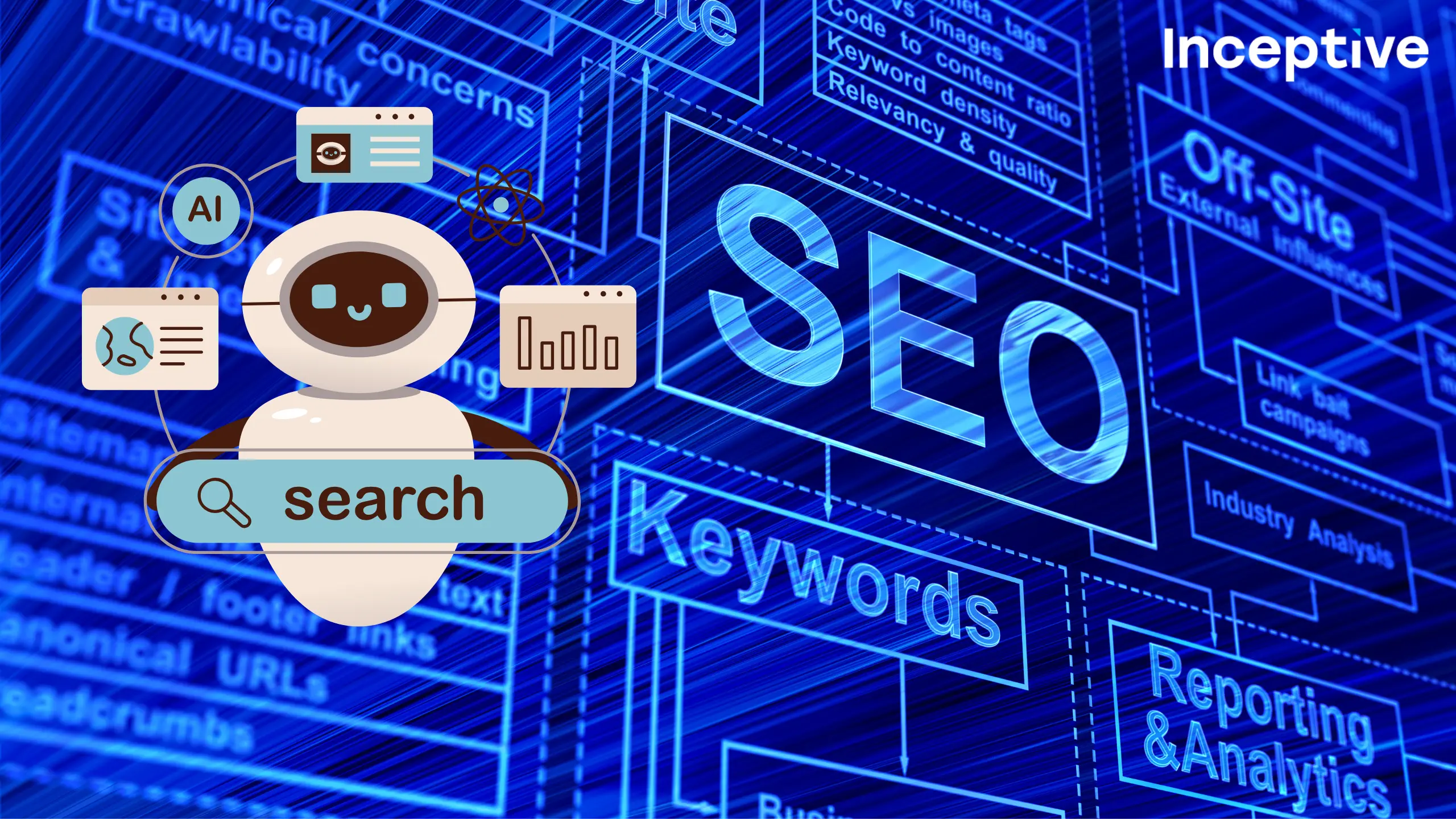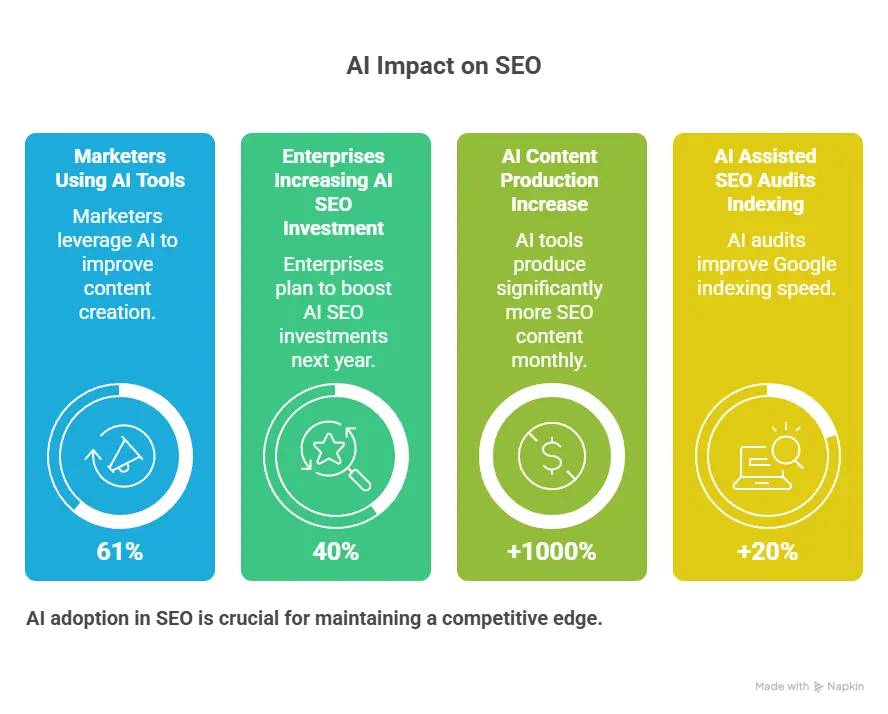In recent years, the digital marketing landscape has undergone a seismic shift. One of the most significant drivers of this change is the rise of Generative AI, which is redefining how content is created, optimized, and ranked on search engines. As professionals deeply involved in digital marketing and SEO, we have observed firsthand how AI-powered tools can transform the way we approach content strategy, keyword research, and user engagement. But the question remains: how exactly is generative AI impacting SEO, and what does it mean for marketers and businesses today?
In this blog, I will provide a comprehensive, experience-based perspective on the influence of generative AI on SEO. From technical implications to practical applications, and even the statistics highlighting its adoption, this article aims to answer the key questions and satisfy professionals seeking both knowledge and actionable insights.

Understanding Generative AI
Before diving into SEO implications, it is essential to understand what generative AI is. Generative AI refers to algorithms capable of creating content—including text, images, audio, and video—by learning patterns from existing datasets. Tools like ChatGPT, GPT-4, and other large language models (LLMs) exemplify this technology. Unlike traditional AI, which primarily analyzes and predicts, generative AI produces novel, human-like outputs based on context.
In SEO, this capability has significant ramifications, as content creation and optimization are at the heart of search engine visibility.
How Generative AI Impacts SEO
Generative AI affects SEO in multiple layers, from keyword optimization to content generation, link-building, and search intent alignment. Below are the most critical areas:
1. Content Creation at Scale
Traditionally, creating SEO-friendly content was a labor-intensive process involving keyword research, content structuring, and editing. Generative AI tools allow marketers to produce high-quality content rapidly. For example:
-
AI-powered content generators can draft 500–1,000 words in minutes.
-
Statistical analysis shows that businesses leveraging AI for content creation can reduce production time by 40–50%, while maintaining readability and keyword integration.
While this is advantageous, the caveat is that AI-generated content requires human oversight to ensure originality, factual accuracy, and alignment with brand tone.

2. Enhanced Keyword Research and Optimization
Generative AI can analyze SERPs, competitor content, and search intent to recommend keywords and long-tail variations that are highly likely to improve ranking. Using AI, we can:
-
Identify latent semantic indexing (LSI) keywords automatically.
-
Predict search intent trends for upcoming months.
-
Automate meta tag and header recommendations to match SEO best practices.
For example, instead of manually researching variations of “digital marketing strategies,” generative AI can suggest “advanced digital marketing tactics 2025” or “AI-driven marketing strategies for small businesses”, which may have less competition but higher conversion potential.
3. Improved Personalization and User Engagement
Search engines are increasingly valuing user experience signals like dwell time, click-through rate (CTR), and bounce rate. Generative AI allows marketers to tailor content more effectively:
-
AI can generate personalized content snippets based on user demographics or behavior.
-
Dynamic meta descriptions, headings, and content blocks can be optimized for individual user segments, increasing engagement and reducing bounce rates.
From a practical standpoint, we observed that personalized AI-generated meta descriptions can increase CTR by up to 20% in A/B tests.
4. Automation of Technical SEO Tasks
Beyond content, generative AI can optimize technical SEO elements:
-
Automated schema markup generation (JSON-LD, FAQ, How-To schemas).
-
AI-driven SEO audits to detect broken links, site speed issues, and mobile usability problems.
-
Predictive analysis for internal linking strategies, helping search engines crawl content more efficiently.
By automating these repetitive tasks, SEO teams can focus on strategic content planning, competitive analysis, and backlinking strategies.
5. Enhanced Multilingual SEO
Global businesses need to produce content in multiple languages. Generative AI can:
-
Translate content accurately while preserving SEO context.
-
Optimize meta descriptions, headings, and alt text in different languages.
-
Identify regional search intent variations and local keywords.
According to a study, AI-assisted multilingual content creation reduces translation costs by up to 60% while maintaining keyword relevance.
6. Challenges and Ethical Considerations
Despite the benefits, generative AI introduces challenges:
-
Content Originality: Search engines may penalize AI-generated content if it appears low-quality or duplicate.
-
Factual Accuracy: AI may hallucinate statistics or references if not verified.
-
Over-Optimization: Excessive reliance on AI suggestions for keyword density can lead to unnatural content.
As SEO professionals, we must balance AI efficiency with human judgment, ensuring content is accurate, authoritative, and aligned with Google’s E-E-A-T (Experience, Expertise, Authoritativeness, Trustworthiness) guidelines.

Practical Applications: How We Use Generative AI in SEO
In my experience managing SEO campaigns, generative AI has become an integral tool:
-
Content Ideation: AI suggests blog topics based on trending search queries and user interests.
-
SERP Analysis: Tools like GPT-powered search analysis predict which keywords can improve ranking.
-
FAQ Generation: We generate structured FAQs aligned with user intent, improving featured snippet eligibility.
-
Meta Tags & Headlines: AI drafts title tags, meta descriptions, and headings optimized for clicks and search engines.
-
Content Summarization: AI condenses long-form reports into digestible snippets for SEO-friendly landing pages.
These applications have helped us reduce content production time by 35–40% and improve organic traffic by up to 25% over six months for client projects.
Statistics Highlighting AI in SEO

-
61% of marketers report using AI tools to enhance content creation (Source: HubSpot 2024).
-
40% of enterprises plan to increase AI-driven SEO investments over the next year.
-
AI-generated content tools can produce up to 10x more SEO-optimized content per month compared to traditional methods.
-
Sites using AI-assisted technical SEO audits see 20–30% faster indexing on Google.
These stats emphasize that adopting AI in SEO is no longer optional but a competitive necessity.
Future of SEO in the Generative AI Era
Generative AI is evolving rapidly, and search engines are also adapting. Google’s algorithms, for example, increasingly reward content that demonstrates expertise and authenticity. Therefore, while AI tools will continue to assist in content creation, human oversight remains critical for:
-
Maintaining brand voice and authenticity.
-
Verifying factual content and statistics.
-
Crafting unique insights that AI cannot replicate.
Furthermore, AI is expected to influence voice search optimization, predictive SEO, and AI-driven SERP features, making it essential for businesses to integrate AI thoughtfully into their SEO strategy.
FAQs on Generative AI and SEO
1. Can AI-generated content rank on Google?
Yes, AI-generated content can rank if it is high-quality, unique, and aligns with user intent. Google emphasizes human oversight and factual accuracy over purely AI-created material.
2. How does generative AI affect keyword research?
Generative AI automates keyword discovery, predicts trends, and suggests long-tail keywords, reducing manual effort and enhancing content targeting.
3. Are there risks in using AI for SEO?
The main risks include duplicate content, misinformation, and over-optimization. Balancing AI efficiency with human review mitigates these issues.
4. What AI tools are best for SEO content creation?
Tools like ChatGPT, Jasper AI, Copy.ai, SurferSEO, and Frase are widely used for drafting, optimizing, and structuring SEO content.
5. Will AI replace SEO professionals?
No. AI assists with efficiency and insights, but strategic planning, content authenticity, and decision-making still require human expertise.
Resource Center
These aren’t just blogs – they’re bite-sized strategies for navigating a fast-moving business world. So pour yourself a cup, settle in, and discover insights that could shape your next big move.
How Much Does It Cost to Hire a Full-Stack Developer?
Hiring a full-stack developer is no longer just a technical decision—it is a strategic business investment. As organizations accelerate digital transformation, build scalable platforms, and modernize legacy systems, the [...]
Why Should You Hire a Full-Stack Developer Instead of a Team?
In today’s rapidly evolving digital economy, organizations are under constant pressure to deliver scalable, high-performance applications faster than ever before. Business leaders are no longer asking whether to build [...]
Should You Hire a Web Developer or Use a Website Builder?
In today’s digitally driven economy, a business website is no longer optional—it is a core asset that defines credibility, customer trust, and brand authority. One of the most common [...]

